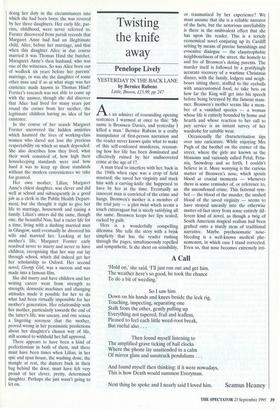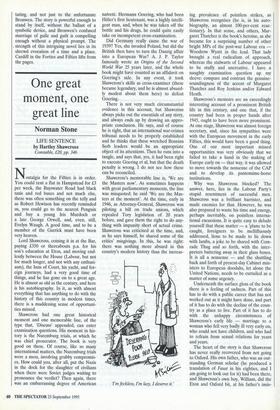Twisting the knife away
Penelope Lively
YESTERDAY IN THE BACK LANE by Bernice Rubens Little, Brown, £15.99, pp 247 As an admirer of resounding opening sentences I warmed at once to this: 'My name is Bronwen Davies, and yesterday I killed a man.' Bernice Rubens is a crafty manipulator of first-person narration and the reader never knows quite what to make of this self-confessed murderess, recount- ing how her life has been dominated and effectively ruined by her undiscovered crime at the age of 17.
A man tried to interfere with her, back in the 1940s when rape was a crop of field mustard; she saved her virginity and stuck him with a carving-knife she happened to have by her at the time. Eventually an innocent man is convicted of the crime and hangs. Bronwen's mother is a member of the trial jury — a plot twist which seems a touch extravagant but is nicely satisfying all the same. Bronwen keeps her lips sealed, racked by guilt.
Hers is a wonderfully compelling dilemma. She tells the story with a brisk simplicity that has the reader rushing through the pages, simultaneously repelled and sympathetic. Is she short on sensibility, or traumatised by her experience? We must assume that she is a reliable narrator of the facts, but the notorious unreliability is there in the ambivalent effect that she has upon the reader. This is a tersely economical novel conjuring up its Cardiff setting by means of precise furnishings and evocative dialogue — the claustrophobic neighbourliness of the street, the homely to and fro of Bronwen's doting parents. The murder itself is followed by a gratifyingly accurate recovery of a wartime Christmas dinner, with the family, lodgers and neigh- bours sitting there, stuffed to the eyeballs with unaccustomed food, to take bets on how far the King will get into his speech before being betrayed by the famous stam- mer. Bronwen's mother seems like a mem- ber of a vanished species -- a woman whose life is entirely bounded by home and hearth and whose reaction to her call to jury service is an instant survey of her wardrobe for suitable wear.
Occasionally the characterisation tips over into caricature. While enjoying Mrs Pugh of the brothel on the corner of the street, where the girls are known as the blossoms and variously called Petal, Petu- nia, Snowdrop and so forth, I couldn't believe in it. More worrying is the curious matter of Bronwen's nose, which spouts blood at crucial moments — whenever there is some reminder of, or reference to, the unconfessed crime. This fictional sym- bol — the blood of the murder, the unshed blood of the saved virginity — seems to have strayed uneasily into the otherwise matter-of-fact story from some entirely dif- ferent kind of novel, as though a twig of South American magical realism had been grafted onto a sturdy stem of traditional narrative. Maybe psychosomatic nose- bleeding is a well-known medical phe- nomenon, in which case I stand corrected. Even so, that nose becomes extremely irri- tating, and not just to the unfortunate Bronwen. The story is powerful enough to stand by itself, without the ballast of a symbolic device, and Bronwen's confused marriage of guile and guilt is compelling enough without a physical prompt. The . strength of this intriguing novel lies in its shrewd evocation of a time and a place. Cardiff in the Forties and Fifties lifts from the pages.



































































 Previous page
Previous page